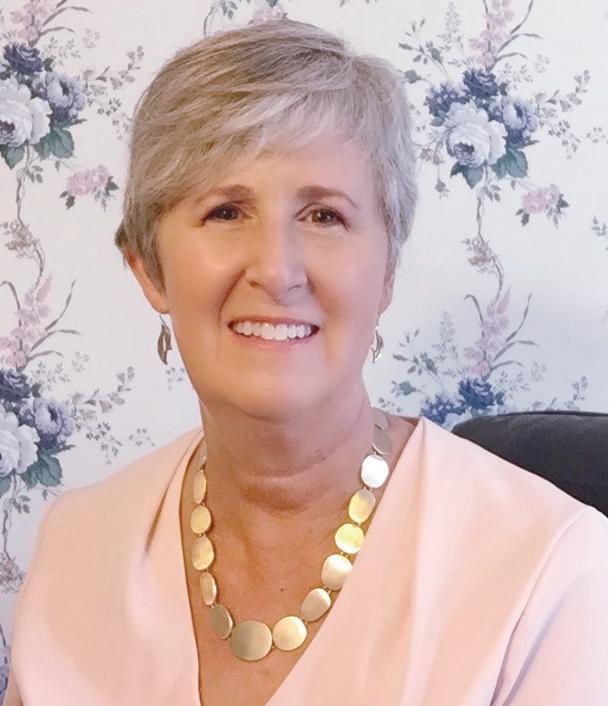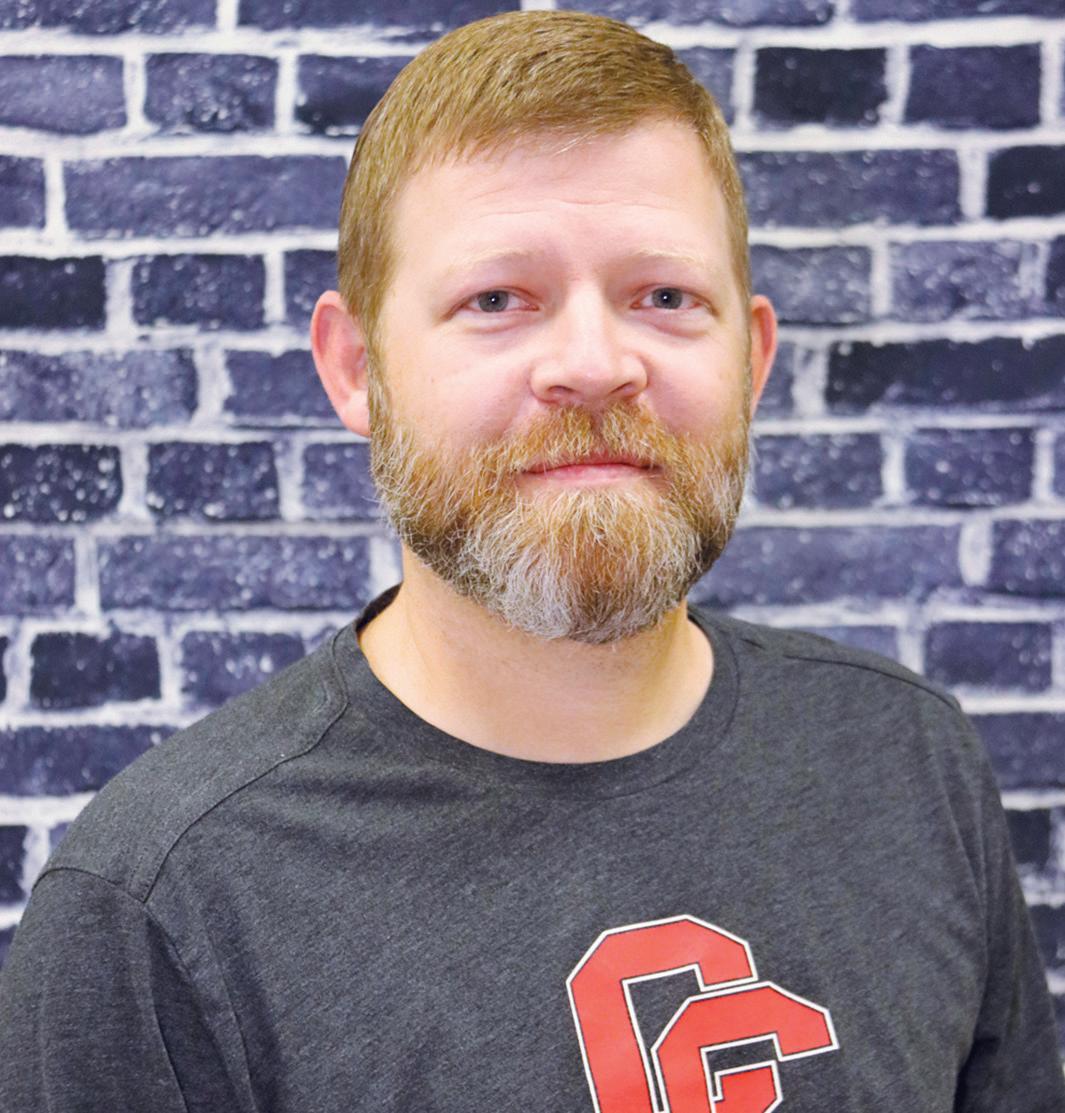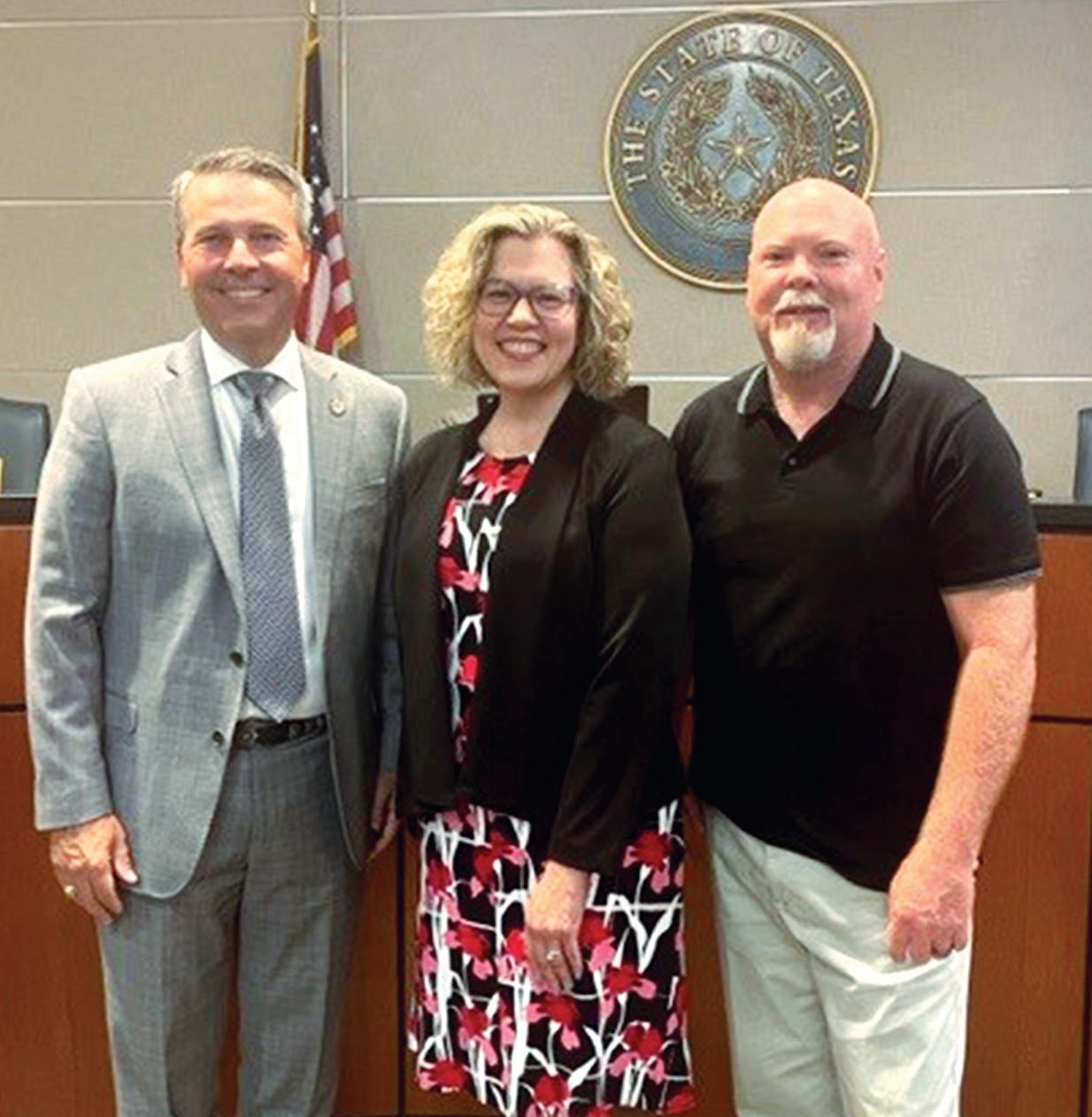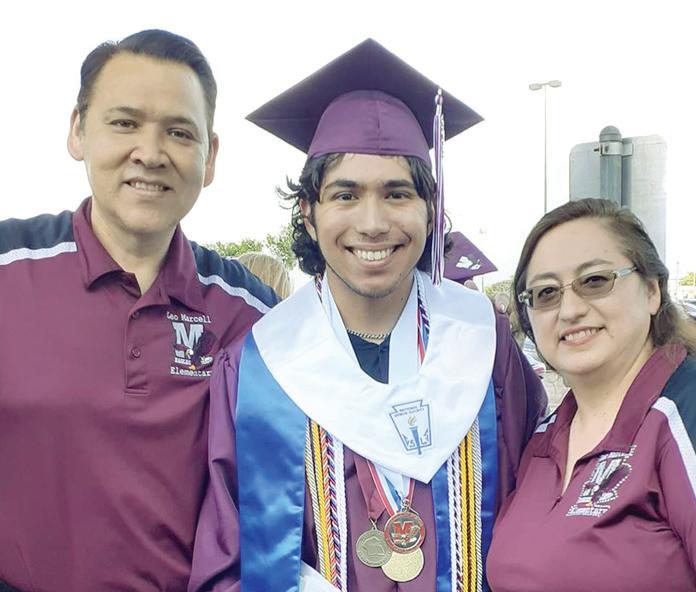
Summer 2023 | Volume 43 | Number 1 THE MAGAZINE of the TEXAS CLASSROOM TEACHERS ASSOCIATION ALSO INSIDE: What’s on the horizon for education issues in the Texas Legislature How the TIA program works | Meet TCTA State President Nydia Alvarez-Alonzo AI in Schools TCTA MEMBERS WEIGH IN ON ARTIFICIAL INTELLIGENCE IN THE CLASSROOM
EXECUTIVE DIRECTOR’S MESSAGE
Be afraid. Be very afraid.
You might recognize the quote in this column’s title, but you may not recall that it comes from the horror flick “The Fly.” In the movie, Geena Davis’s character is warning a woman about her involvement with the Jeff Goldblum creature who is becoming a part fly, part human monster.
You might guess that this is a lead-in to a warning about the legislature or some other force that could endanger public education and teachers. State leaders failed, completely and totally, to meaningfully address the teacher shortage that has reached crisis levels in Texas. Educators and those who support them are right to be horrified about lawmakers’ refusal to respond to teacher needs, and their inability to come together in support of our state’s public education system.
But, in fact, the monster to be feared is you ... and I mean that in the best possible way.
Fear is a powerful motivator, and not necessarily a bad one. The fight-or-flight instinct can protect a person in a dangerous situation. Fear of failure can be a catalyst for pushing students toward success. And fear of getting voted out of office can prompt reluctant legislators to pay more attention to their teacher constituents.
It seems like legislators aren’t afraid of teachers anymore. There was a time when riling up educators was a good way to get “unelected.” The classic example is Gov. Mark White, whom teachers blamed for the HB 72 reforms in 1984 that included an insulting teacher competency exam. Teachers are often credited with his subsequent defeat at the polls. But that was nearly 40 years ago.
A handful of other election losses have been attributed to the education community, but for the most part, those who vote against teacher interests have done so with impunity. The common perception of teachers is that they don’t vote as a bloc, and far too often, don’t vote at all.
Some educators are too tired, or too busy, or too beaten down to muster the energy to add political activism to their to-do list. But — and forgive my extension of the metaphor — movie plots are full of creatures that just wanted to be left alone, but eventually had enough and rose up to defeat those who had done them wrong.
Are the days of teachers rising up permanently gone? I don’t think so. Despite the current dismissal of teacher concerns, I believe lawmakers know that the force to be feared is still out there.
As a recent example, you may remember the successful public school rally at the Capitol in 2017 that preceded a too-close-for-comfort win for Lt. Gov. Dan Patrick over challenger Mike Collier (Patrick garnered just over 51% of the vote). Patrick subsequently championed a significant teacher pay raise in the 2019 legislative session. The version that eventually passed was not the $5,000 across-the-board increase he had advocated, but there’s no question that Patrick’s push for higher pay kept the issue front and center during that session.
In current news, despite having time this summer for a special session on education, Gov. Greg Abbott is expected to schedule it for fall. It has been reported that this is to avoid having to face the crowds of school employees who might have time to visit the Capitol in the summer months to lobby their legislators.
There’s more than a hint of fear in the continuing legislative efforts to weaken teacher associations like TCTA. In previous sessions, lawmakers have tried to prohibit payroll deduction of membership dues in the hope that a less convenient payment
Continued on page 23
Texas Classroom Teachers Association
PO Box 1489, Austin, TX 78767-1489
Office hours: 8 a.m. to 6 p.m., weekdays
Phone: 888-879-8282
Fax: 512-469-9527
Website: tcta.org
2023-24 Executive Board
President
Nydia Alvarez-Alonzo, Mission President-Elect
Melody Young, Sherman
Immediate Past President
Eleanore Malone, Winona Budget
Vivian Burleson, Northside
Curriculum & Instruction
Cristal Isaacks, Levelland
Governance
Jennifer Hutchinson, Hays Consolidated Legislation
Brec Espinoza, Brownwood Membership
Debra Helbert, Lamar Consolidated Professional Rights & Responsibilities
Sharron Wood, Deweyville

Teacher Personal Services
Melanie Love, Pottsboro
Staff Contacts
Executive Director
Ann Fickel
General Counsel
Lonnie F. Hollingsworth Jr.
Attorneys
Lonnie F. Hollingsworth Jr.
Holly Eaton
Michael Currie
Gerald Francisco
Julie Leahy
Paige Bruton Williams
Business Office
Park Brigtsen Communications
M. Clare Haefner
Legislation
Paige Bruton Williams
Lonnie F. Hollingsworth Jr.
Ann Fickel
Holly Eaton
Pamela McPeters
Quinn McCall
Membership
Persie Ngo-Hatchie
Professional Development and Advocacy
Holly Eaton
Services Corporation

Jan Lanfear
Contract Attorney
Lindsay Gustafson
Senior Consultant
Jeri Stone
About TCTA
The Texas Classroom Teachers Association is an independent association for Texas teaching professionals that was founded in 1927. TCTA is based in Austin and is the only statewide teachers association that limits active-level membership to those directly involved in classroom teaching or teaching support.
2 tcta.org | 888-879-8282
AI in Schools
14 On the Cover
AI in the Classroom
In very simple terms, artificial intelligence is a branch of computer science in which computers simulate or imitate intelligent human behavior. The rapid rise in popularity of ChatGPT in 2023 brings opportunities and concerns for AI’s use in the classroom. On one hand, it can simplify tasks and save time. On the other, it can facilitate, or even encourage, student cheating.

TCTA members weigh in on whether AI belongs in the classroom.
Meet TCTA President Nydia Alvarez-Alonzo
TCTA 2023-24 State President Nydia Alvarez-Alonzo has spent her life in the Rio Grande Valley, giving back to her community in any way she can, from teaching at Leo Marcell Elementary in Mission CISD and cheering on the Mission Eagles, to participating in the Texas Citrus Fiesta and the city’s National Night Out event.
But her career didn’t start in the classroom. Graduating with a degree in business management, Alvarez-Alonzo worked in the hospitality industry at hotels and restaurants after college. Read more about what led her into teaching.
18
What’s on the Horizon in the Legislature?
Prior to the regular session, which ran from mid-January to the end of May, there seemed to be a perfect set of circumstances that forecast good things for schools and teachers in 2023.
State leaders were paying attention to the teacher shortage, resulting in the formation of a Teacher Vacancy Task Force, and the comptroller projected a record $33 billion budget surplus.
Optimism seemed justified. But we underestimated the legislature’s ability to get it all wrong. THE
providing news and opinions in the interest of education excellence. All contents are copyrighted and may not be reproduced without the publisher’s permission. The views and opinions contained in this publication are not necessarily those of the publisher. Copyright © 2023. Publication schedule is quarterly. Annual membership dues for TCTA are $175, $5 of which is allocated to a one-year subscription to THE CLASSROOM TEACHER. Subscriptions for nonmembers are available for $10 per year. POSTMASTER: Please send changes of address, articles and/or photographs to: Editor, THE CLASSROOM TEACHER, PO Box 1489, Austin, Texas 78767-1489. TCTA is located at 700 Guadalupe, Austin, Texas 78701. PERIODICALS POSTAGE PAID AT AUSTIN, TEXAS.
3 Summer 2023 | THE CLASSROOM TEACHER 2 Executive Director’s Message 4 TCTA News & Notes 7 Legal Notes 10 Washington Watch 12 In the Classroom DEPARTMENTS Summer 2023 | Volume 43 | Number 1
16
CLASSROOM TEACHER (ISSN-0279-2494) is the official publication of the Texas Classroom Teachers Association (TCTA),
Summer 2023 Volume 43 Number THE MAGAZINE of the TEXAS CLASSROOM TEACHERS ASSOCIATION ALSO INSIDE: What’s on the horizon for education issues in the Texas Legislature How the TIA program works Meet TCTA State President Nydia Alvarez-Alonzo
CONTENTS FEATURES
TCTA MEMBERS WEIGH IN ON ARTIFICIAL INTELLIGENCE IN THE CLASSROOM
History, civics scores drop for eighth graders on NAEP
Scores in U.S. history and civics for eighth graders are down across the country, according to recent results from the Nation’s Report Card. This year’s history scores are the lowest recorded since the assessment began in 1994, and the new data mark the first-ever drop in civics.
U.S. Education Secretary Miguel Cardona said in a statement that the results from the National Assessment of Educational Progress further underscore the “profound impact the pandemic had on student learning in subjects beyond math and reading.”
“We need to provide every student with rich opportunities to learn about America’s history and understand the U.S. Constitution and how our system of government works,” Cardona added.

The results follow recent national declines in reading and math among fourth and eighth graders.
NAEP assesses history and civics proficiency for eighth graders in a nationally representative sampling taken every four years. The results released May 3 are from exams administered in the spring of 2022.
The scores in U.S. history declined five points, from 263 in 2018 to 258 in 2022, continuing a downward trend that began in 2014. Only 14% of students reached at or above “proficient” in history. In civics, scores dipped two points, the first decline since the test began in 1998. About 22% of students met the “proficient” benchmark in civics.
U.S. history scores declined for Black, Hispanic and white students, as well as students of two or more races. Score declines in civics followed similar patterns by racial group. Some students’ scores didn’t fall, though. In civics, the scores of higher-achieving students—those who scored at the 75th or 90th percentiles—held steady, while lower-performing students’ scores declined. In history, only students at the 90th percentile didn’t perform worse. All other students’ scores declined.
The distribution of scores changed, too, with more students in both subjects scoring “below basic”— the lowest level on the NAEP.
Representatives from civics advocacy groups and social studies professional organizations told Education Week the pandemic and mounting legal restrictions on what teachers can discuss in the classroom have challenged educators over the past few years. But they also criticized an education landscape that they say has long prioritized reading and math in early grades, to the detriment of social studies.
Read the full Education Week article at https://tinyurl. com/6wf67sn4
Nation’s Report Card shows big decline in math, reading scores for 13-year-olds
The average test scores for the nation’s 13-year-olds have dropped sharply in math and dipped in reading since 2020, according to new data from National Assessment of Educational Progress.
Average scores, from tests given last fall, declined 4 points in reading and 9 points in math compared with the 2019-20 school year, and are the lowest in decades. The declines in reading were more pronounced for lower-performing students, but dropped across all percentiles.
On a scale of 500 points, the math declines ranged from 6 to 8 points for middle- and high-performing students, to 12 to 14 points for low-performing students. The math results also showed widening gaps based on gender and race. Go to nationsreportcard.gov to explore the Nation’s Report Card data in depth.
Department of Education lifts oversight of special education programs in Texas
After years of noncompliance, the Texas Education Agency has fulfilled all its needed requirements to comply with federal law regarding special education, according to a letter from the U.S. Department of Education sent to TEA Commissioner Mike Morath on June 21.
The letter said the USDE’s Special Education Program office decided to remove the special conditions it had placed on the state agency in 2018 after it completed its requirements to meet federal standards.
“TEA will continue to work with families, advocates and school leaders to improve services and refine processes to ensure that students with disabilities attending Texas public schools receive the highest quality education possible,” TEA said in a statement, calling its accomplishment a “milestone.”
4 tcta.org | 888-879-8282 TCTA NEWS & NOTES
Texas high schoolers show improvement on STAAR tests
This year’s STAAR end-of-course exam scores show progress and continued academic recovery among Texas public school students who endured multiple years of pandemic-induced disruptions to learning, according to data released by the Texas Education Agency in June.
The number of high school students who achieved passing scores of “approaches grade level” or above increased in all five tested subjects in 2023 when compared to 2022 and 2021, with scores in every subject but Algebra I also eclipsing pre-pandemic scores from spring 2019:
• Algebra I: 78% approaches; 45% meets, 24% masters
• Biology: 89% approaches; 57% meets, 22% masters
• English I: 71% approaches; 54% meets, 14% masters
• English II: 74% approaches; 56% meets, 9% masters
• U.S. History: 95% approaches; 71% meets, 39% masters

“I appreciate the dedication and skill of Texas educators as they work to meet the needs of their students every day,” Education Commissioner Mike Morath said in a statement. “STAAR is designed to provide parents and teachers with a clear understanding of how well students learned this year’s

academic material and whether they are prepared for the next grade level and for life after graduation.”
Go to https://tinyurl.com/2ffwc5sf to see how students in your district performed this year. Spring 2023 STAAR scores for grades 3-8 had not been released at press time, but are expected by mid-August. Read eUpdate for the latest news.
Make the most of your TCTA membership!
advantage of TCTA’s cost-saving programs as you plan your next adventure. Log in at tcta.org/membership/discount-programs to find deals on amusement parks, movie tickets, cruises, flights, zoos, museums, concerts and more. Save on car rentals with Alamo, Avis and Budget. Reserve hotel rooms with participating Choice Hotels or Wyndham Hotels & Resorts, which include La Quinta properties. 5 Summer 2023 | THE CLASSROOM TEACHER
Take
TCTA NEWS & NOTES
TRS approves ActiveCare premiums and benefit changes

The TRS Board of Trustees met in late May to approve rates for ActiveCare health insurance during the 2023-24 school year. Rate changes range from reductions to increases, depending on region, plan and level of coverage (e.g., individual vs. family coverage). There are both positive and negative benefit changes to be aware of in the coming year. The legislature approved almost $600 million in funding for ActiveCare to help bring down rates that were expected to soar after a year of keeping rates stable in 2022-23. There is no additional funding for districts that are not participating in ActiveCare. Go to https://tinyurl.com/34syujb7 to read more on benefit changes and go to https://tinyurl.com/ms77wf6r to find premium rates in your region.
TRS also approved new premium rates and plan changes for the TRS-administered HMO plans. Go to https://tinyurl. com/29jatd4h to read more.
Retiree stipends coming in September
Eligible TRS retirees age 70 and older received notification from TRS in July about the amount they can expect to receive when stipends are issued in mid- to late September. These one-time checks, ranging from $2,400 to $7,500 based

on an eligible annuitant’s age, were approved by the Texas Legislature during the 2023 regular session.
Lawmakers also approved a cost-of-living increase for eligible TRS retirees, ranging from 2% to 6% based on retirement date, that will go into effect in January 2024, if approved by voters in November.
For more information about the COLA and stipends, go to https://tinyurl.com/mvtxuu9j
USDE updates its guidance on prayer in public schools
The U.S. Department of Education has issued updated guidance on prayer in public schools.
The guidance follows last year’s U.S. Supreme Court decision Kennedy vs. Bremerton, which held that a public school district could not stop a football coach from praying on the 50-yard line after games. The court ruled that such prayer was a personal religious observance and that preventing someone from engaging in such a practice violated the First Amendment’s protections for free speech and the free exercise of religion.
The new guidance says “Teachers, school administrators, and other school employees may not encourage or discourage
Surgeon general warns social media can harm youth mental health
In May, the U.S. surgeon general called for tech companies and lawmakers to take “immediate action” to protect children’s mental health on social media.
The call came after a national survey by the CDC sounded a new alarm about teens in crisis. It showed nearly 30% of teenage girls said they considered dying by suicide, and three out of five girls said they felt persistently sad or hopeless.
“Our children and adolescents don’t have the luxury of waiting years until we know the full extent of social media’s impact,” Surgeon General Vivek Murthy said. “Their childhoods and development are happening now.”
6 NEWS & NOTES
your success with us! Were you chosen as your campus Teacher of the Year? Did you win an award or receive grant funding? Email communications@tcta.org and tell us about your recognition so we can share it in The Classroom Teacher.
Share
What is the Teacher Incentive Allotment?
TheTeacher Incentive Allotment program was created by the Texas Legislature in 2019 to provide a pathway for “top teachers” to earn six-figure salaries and to help attract and retain highly effective teachers at traditionally hard-to-staff schools.

How Do I Qualify For Funds?
Teachers can receive a designation that entitles them to an allotment by being designated as recognized, exemplary or master under a local teacher designation system approved by TEA; or by holding National Board certification, which qualifies them for automatic “recognized” designation. Teacher designations are ultimately determined by the locally developed teacher designation system plan, as approved by TEA. District-determined designation criteria and cut points for each level of designation are included in the local plan.
How Much Money Can I Receive?
Allotments vary by designation level, socioeconomic tiers of campus students, and whether a campus is rural. Currently, allotments range from $3,000 to $9,000 annually for a recognized designation,
$6,000 to $18,000 annually for exemplary and $12,000 to $32,000 annually for a master designation. All designations last for five years. A teacher retains their designation when moving to another campus or district, even if the new district does not participate in the TIA program.
Are TIA Funds TRS Eligible?
Funds received as a TIA allotment usually count as compensation for TRS purposes, but this depends on how your district has structured the payments.
How Does a District Become a TIA District?
A district choosing to participate in TIA must adopt a plan that receives approval from TEA, collect data to identify teachers eligible to receive a designation, report the designation
to TEA and then distribute funds to teachers.
During the first year of the process, districts are required to develop a system. One of the “success factors” identified by TEA is whether the district has formed a district system development committee. That committee is tasked with decisions that make a significant impact on how teachers will experience TIA in that district. The committee’s responsibilities may include identification of which campuses, and which teaching assignments by campus, grade and subject, will be eligible to participate.
What Kinds of Issues Should Teachers Look For As a District Develops Its Plan?
Teachers should encourage districts to include favorable provisions in the plan, including:
• Making eligibility available to as many teachers as possible (don’t restrict it to only teachers of tested subjects).
Continued on page 8
7 Summer 2023 | THE CLASSROOM TEACHER LEGAL NOTES
Continued from page 7
• Ensuring inclusion of special education teachers.
• Including an opt-out provision for teachers who don’t want to participate.
• Limiting TIA eligibility to teachers holding active Texas teacher certification.
• Including provisions in the district’s spending plan to ensure that teachers who resign or retire from the district receive earned funds.
• Limiting the weight assigned to the student growth component of the local designation system, given the questionable practice of evaluating teacher performance based on student performance.
• Assigning a reasonable percentage weight to additional components other than teacher observation to avoid giving undue weight to teacher observation.
How Can Teachers Provide Feedback About Provisions They Would Like to See in the Plan?
There are several ways for a district to incorporate stakeholder engagement during system development, including focus groups, surveys, professional developments, or other methods. This process can serve as opportunity for individual teachers to encourage the district to include favorable provisions in the plan such as those listed above. TEA also requires districts to administer a teacher “buy-in” survey to gauge teachers’ understanding and degree of support for their district’s local teacher designation system prior to system implementation. TCTA encourages teachers to serve on the system development committee to advocate for the inclusion of favorable provisions.
What is in a Local Teacher Designation System?
TEA requires that local teacher designation systems address teacher observation, student growth and a spending plan. Optional components are also permitted, such as teacher leadership

responsibilities, teacher mentorship responsibilities, family surveys, teacher peer surveys and contributions to the broader school community.
The teacher observation component must rely on an approved teacher observation rubric including T-TESS, Marzano’s Teacher Evaluation Model, the rubric created by the National Institute for Excellence in Teaching and The Danielson Group, or another rubric that is based on observable, jobrelated behaviors, and a clear proficiency indicator.
Districts have some discretion in selecting which student growth measure to use, and although they can do so, they are not required to use state standardized tests. Examples of possible student growth measures include student learning objectives, teacher-created assessments,
portfolios, Fitnessgram and DIBELS. The spending plan component details how the allotment will be apportioned and the effect of retirement or resignation on the right to an allotment. By law, 90% of each allotment must go to teachers employed at a designated teacher’s campus. A district can retain no more than 10% of the designated allotment for costs associated with supporting TIA and teacher development. Note that there is no requirement that 90% of the funds go to the designated teacher; how to allocate that 90% of funds is a local decision included in the local plan. Some districts allocate 100% of the TIA funds to teacher compensation, so that should be a consideration for the plan.
TCTA strongly encourages that a majority of that 90% of TIA funds go
8 tcta.org | 888-879-8282 LEGAL NOTES
to the designated teacher, although some districts use some of the funds to reward teams of teachers in addition to the designated teacher. Districts can use their 10% of funds to pay for teachers on the designee’s campus to earn National Board certification.
Does My Evaluation Impact My Ability to Receive a Designation?
Yes. Districts must have observation and student data from the data capture year for each teacher put forth for designation. All teachers in eligible teaching assignments, even if not eligible to earn a designation, must have a minimum of one 45-minute observation during the data capture year, including scores on all observable domains. Designation criteria and cut points for each level of designation should be set out in the plan.
Districts can maintain annual appraisal waivers for teachers once they have received a designation.
What If I Get A Bad Evaluation?
It’s important for teachers to be familiar with the criteria a district has established to determine eligibility for a designation because the teacher is
going to receive an evaluation that may qualify them to receive a designation. If a teacher receives an evaluation with low scores, the teacher may choose to talk to the appraiser about the scores, formally respond to the evaluation, request a second appraisal, or file a grievance. The decision to exercise these options must be made shortly after receipt of the appraisal. A teacher cannot wait until they have been informed that they did not qualify for the designation and then contest the evaluation.
After initial designations are made during the data collection year, teachers may be put forth for a higher designation in later years if their performance qualifies them, but they cannot be submitted for a lower designation during the five-year period of their designation.
I Have Received a Designation. When Will I Get the Money?
For the first year of a teacher’s designation, districts are notified of funding amounts by designation level and campus in the spring, and funds arrive the following September. Following the initial payment, districts receive regular funds based on projections according to their regular FSP payment schedule, with
Connect with us!
In addition to the many valuable resources you’ll find on our website, tcta.org, and in the eUpdate newsletter, TCTA’s social media channels include Facebook, Twitter, Pinterest and YouTube. Join the discussion and follow us for valuable reminders, tips on classroom resources, links to the latest education news, and other bits of information.

If you’re not receiving eUpdate in your inbox, check your spam or junk folder and make sure communications@ tcta.org is in your contacts or on your safe-sender list.
settle-up each September.
For the first year only of designations, districts may choose to compensate teachers in advance of September funding, or to wait until funds arrive.
If a designated teacher moves to a new district, the TIA allotment follows the designated teacher to the new district.
If the new district has a TIA plan, allocation of funds will be based on that district’s plan. If the teacher’s new district does not have a TIA plan in place, that district must develop a plan for how to spend the allotment funds, designating at least 90% for compensation of teachers on the designee’s new campus.
However, districts are not required to forward funds if the designated teacher resigns or retires before Aug. 31.
If a designated teacher moves to a new district or campus between school years, the allotment for the next school year will be recalculated in April based on the new campus’ rural status and level of socioeconomic need.
This article is for information only and is not a substitute for legal advice. Members with questions about their district’s TIA plan should call the Legal Department at 888-879-8282 to speak with a staff attorney.
Need
to update your email?
Log in to your membership record at members.tcta.org/members and update your information, call the Membership Department at 888-879-8282 or resubscribe to eUpdate using the link to our online form at tcta.org/eupdate.
9 Summer 2023 | THE CLASSROOM TEACHER
Facebook facebook.com/texascta Twitter twitter.com/texascta Pinterest pinterest.com/texascta YouTube youtube.com/texascta
LEGAL NOTES
Supreme Court ruling impacts student loan forgiveness
Affirmative Action
A promise to cancel $10,000 of student debt for low- to middle-income borrowers was part of President Joe Biden’s 2020 campaign platform.
U.S. Sens. Elizabeth Warren (D-MA) and Bernie Sanders (I-VT) have both introduced legislation to support their student loan forgiveness proposals.
Given the narrow margins of party membership in the House and Senate, these partisan bills have not been able to advance.
The next tactic employed by Democrats was to use executive authority to enact wide-scale student loan cancellation. To do so, the administration relied on presumed authority under the Higher Education Relief Opportunities for Students (HEROES) Act, to implement a program of targeted loan cancellation in response to the financial harms caused by the COVID-19 pandemic.
Democrats argued that Congress, through the HEROES Act, expressly authorized the secretary to waive or modify any existing Title IV provision during emergencies to provide borrowers with financial relief.
Republicans countered that the department essentially created a new loan forgiveness program “that covers 95% of student loan borrowers and applies to them regardless of how the pandemic individually affected them.”
The Congressional Budget Office estimated that the administration’s plan would cost the federal government $440 billion.
In late June, the U.S. Supreme Court agreed (in a 6-3 decision) that the statute the administration relied on does not authorize the Secretary of Education to exercise executive action for student loan debt cancellation.
The Biden administration was quick to respond to the ruling, taking another run
at exercising loan forgiveness through a much longer rulemaking process attached to the Higher Education Act.
The act contains a provision that gives the Secretary of Education the authority to “compromise, waive, or release any right, title, claim, lien, or demand, however acquired, including any equity or any right of redemption.”
It is very likely this second attempt will also land in court to determine if the Higher Education Act statute will make any difference in the outcome.
The U.S. Department of Education chose not to use the act initially as a more authoritative statute, which may have been intentional. This alternative strategy may easily delay any debt relief until after the 2024 election, becoming another talking point on the 2024 campaign trail.
In the meantime, the Education Department is moving as many borrowers as possible to a revised income-driven repayment program that has lower thresholds. In mid-July, the department announced it was discharging $39 billion in student loan debt under changes to the Public Service Loan Forgiveness program for borrowers with permanent disabilities and others who were defrauded by institutions.
The department is also establishing an “on-ramp” for borrowers to ease back into making monthly payments by ensuring a borrower’s balance does not grow from unpaid monthly interests. Participants will not be reported to credit bureaus or have their loans placed in default, considered delinquent or referred to debt collection agencies.
Anyone repaying their student loans is eligible to enroll this summer and the on-ramp to repayment will span Oct. 1, 2023, to Sept. 30, 2024. For details on requirements and the application process, go to studentaid.gov
In a second case, the Supreme Court ruled on a challenge of race-conscious admissions programs at Harvard University and the University of North Carolina at Chapel Hill. The court struck down the use of affirmative action, with a vote along ideological lines. The universities were viewed to have discriminated against white and Asian American students through admissions policies that benefited applicants from underrepresented racial backgrounds.
Affirmative action policies have shaped college admissions for more than half a century, including at the University of Texas.
During the civil rights movement in the 1960s, universities were pressed to integrate higher education which at the time lacked equal representation of women and people of color.
Over the years, student demographics have shifted, and eventually affirmative action policies received pushback — particularly among applicants who claimed they were the victims of reverse discrimination.
While the ruling will prohibit the consideration of race in admissions practices going forward, the Education Department countered that students may frame the challenges they have overcome, which could include discrimination, in their application submissions. This demonstration may be viewed as a measurement of an individual’s grit or perseverance.
The ruling does not provide guidance on how universities award financial aid, which is a tool in maintaining a diverse student body.
However, conservatives may be further encouraged to challenge Diversity, Equity and Inclusion efforts on campuses. The ruling may cause institutions to reevaluate their legacy and student-athlete admissions policies.
Another concern is the potential implications of efforts to develop a diverse teacher workforce, such as
10 tcta.org | 888-879-8282
WASHINGTON WATCH
Since2020, several attempts have been initiated to relieve borrowers from the burden of federal loan repayments for undergraduate and graduate level coursework.
grow-your-own programs and teacher residencies that target Black and Hispanic college students.
The Education Department has responded to the ruling, saying it will issue guidance on addressing lawful admissions practices and provide suggestions for the inclusion of student experiences in overcoming adversity as criteria for admission.
The Biden administration has said it
will convene a Summit on Educational Opportunity to support universities’ efforts to expand access to higher education opportunities and maintain a diverse student body.
On a K-12 level, school leaders may continue to use race-conscious policies and promote racial diversity in elementary and secondary schools. Districts that have integration plans would be cautioned to structure
participation based on family income. While the Supreme Court ruling did not apply to elementary and secondary schools, many note that the equity gaps that exist in K-12 education impact the diversity of student populations at higher education institutions.
This article is provided by Van Scoyoc Associates, TCTA’s retained lobby firm in Washington, D.C.

11 Summer 2023 | THE CLASSROOM TEACHER WASHINGTON WATCH
In late June, the U.S. Supreme Court ruled (in a 6-3 decision) that the statute the Biden administration relied on to forgive federal student loan debt for thousands of borrowers does not authorize the Secretary of Education to exercise executive action for student loan debt cancellation.
Called to the Classroom
RYAN COSBY STRIVES TO BUILD STRONG RELATIONSHIPS
Ryan Cosby views teaching as his mission field. Initially a Christian studies major intent on becoming a youth pastor, Cosby says he felt a call to teach while in college at Howard Payne University in Brownwood.

“I figured as a youth minister I would impact the lives of 30 students a year, but as a teacher I could impact 60 to 100 a year. It seemed like a bigger mission field,” he says. “I became a teacher to make a positive impact on students.”
Entering his 21st year in the classroom, he hopes he’s shown his students the importance of building relationships and doing their best, even when they struggle to learn math at Colorado Middle School in Colorado City, a small town west of Abilene along Interstate 20.
At the start of every school year, Cosby has his eighth graders write a short paragraph about their feelings toward math. More than 75% say they don’t like or hate math because it’s hard for them, he says.
“I love rebuilding their confidence in math and showing them that they are capable of anything they put their mind to through hard work and perseverance,” Cosby says. “It’s not always easy, some students struggle with math, no matter how hard they try.”
Since his students must stick with the subject all year, Cosby does his best to be encouraging. “I remind them that their worth is not determined by how easy or hard math comes to them, they are worthy because they are them.”
Staying optimistic is something Cosby learned from his father.
“My dad always told me growing up, ‘Son, if you’re going to do something, you might as well do your best.’ No matter what’s going on in my life, when I get in the classroom, I get paid to teach eighth grade math. Every student who enters my classroom deserves my best effort, so that’s what I try to give them, my best.”
Cosby’s best efforts led to his selection as the 2023 Region 14 Secondary Teacher of the Year. And while he appreciates the honor, he’s still humble, especially when it comes to offering advice to other teachers. Since every teacher’s experience is unique, he encourages fellow educators to learn their craft well.
“Know how to reach all students, regardless of background, ability or behavior. Teachers hear all the time that the key to good teaching is relationships, but if you can’t teach well, your students will see that,” Cosby says. “Students want us to be teachers. … They actually want to learn, whether they act like it or not.”
He also says teachers should show their students they care
“Someone noticed what I was doing and thought it was worthy of recognition. For me that person was my kind, hardworking, wonderful Principal Mrs. Toombs. I work with fantastic teachers, all of whom are worthy of the same recognition. Every human desires to be seen. All students desire to be seen. See them all.”
2023 Region 14 Secondary Teacher of the Year
Current job: Eighth grade math teacher, Colorado Middle School, Colorado ISD
TCTA member for 20 years
Education: Bachelor’s in Education, Howard Payne University
Certifications held: 6-12 Secondary Mathematics, EC-12 Special Education, 6-12 Secondary Art, 4-8 Generalist
by doing everything they can to help every student succeed. “Relationships are important, but the relationships should be built through and around the content you are teaching,” Cosby says. “Make contact with every student every day through the content, not just a high five when they come into the classroom. Give each student, one on one, every day, affirmation or guidance in the subject you are teaching.”
12 tcta.org | 888-879-8282
IN THE CLASSROOM
RYAN COSBY
It’s All About Chemistry
DIANA GANO MAKES HANDS-ON LESSONS, LABS FUN
Diana Gano turned to teaching after 10 years as a chemical engineer.

Working for a large company in research and development, Gano says she wanted more flexibility as she started a family. But a part-time job with the company fell through following the birth of Gano’s second daughter.
“That triggered me to stop at the nearby university to find out what it would take for me to become a teacher,” she says. “I started taking classes at night and weekends and earned a master’s in education and my Pennsylvania state certification after two years.
“Little did I know how much work teaching actually was, but I loved it, and I had summers and holidays with my kids,” she says. “Despite the huge workload, teaching is such a fulfilling job — every day I help someone or make an impact on someone, and the interactions I have with the kids in every class period are what give me the energy to keep doing what I enjoy.”
This fall marks her 22nd year in the classroom and her 16th year teaching AP and Pre-AP Chemistry at Glenda Dawson High School in Pearland ISD, which is in the Houston area. She’s also the chairperson of her school’s science department.
Gano loves the “aha” moments her students have, and the excitement she sees when they figure something out on their own, or with a little help from her.
“I do a lot of demonstrations and hands-on labs, and my students love to see the chemistry with their own eyes and perform lab experiments themselves,” she says. “I love that I can share my interest and excitement about chemistry by wearing nerdy shirts and telling awful chemistry jokes and that I have the background to explain to my students WHY what they’re learning is relevant.”
Despite the challenges of the COVID pandemic and its aftermath, Gano says her students are still excited to learn and open to being challenged, and their enthusiasm keeps her motivated.
“If I ever get a thank-you note or an encouraging sticky note from a student, I’ll put in on my computer so I can see it every day and give myself a little boost if I need it.”
Gano says teachers must continuously work to keep their own interest and enthusiasm up. In science, she says this is best done by learning new ways to present material such as new labs and demonstrations. That keeps students interested and ensures her lessons stay fresh. She also enjoys learning from other teachers.
“As much as possible, teachers should collaborate with their peers — even veteran teachers like me can learn from younger teachers, who have a different perspective and different types
“My school and district do a fantastic job of providing funding for lab equipment, chemicals and teacher supplies, but I find that there are a lot of fun things that I do that I end up spending my own money on. The H-E-B award allows me to continue to do those things guilt-free!”
2023 H-E-B Excellence in Education Award for Lifetime Achievement in Secondary Education state finalist
Current job: AP and Pre-AP Chemistry teacher and Science Department chair, Glenda Dawson High School, Pearland ISD
TCTA member for 18 years
Education: Bachelor’s and master’s in Chemical Engineering, Rice University; Master’s in Education, Arcadia University
Certifications held: 8-12 Chemistry
of interactions with the material and with their students. I learn something every time I walk into another teacher’s classroom, and every unit I try to pick at least one thing to do differently — perhaps presenting the material in a slightly
Continued on page 21
13 Summer 2023 | THE CLASSROOM TEACHER
DIANA GANO
IN THE CLASSROOM
AI in the Classroom
VIEWS MIXED ON WHAT ROLE, IF ANY, ARTIFICIAL INTELLIGENCE TOOLS SHOULD PLAY IN SCHOOL
When prompted to write an introductory paragraph for an article on the use of artificial intelligence in schools, the online AI writing generator returned this:
Welcome to the world of tomorrow, where technology is revolutionizing the way we learn and teach. In this era of artificial intelligence, the role of AI in schools is becoming increasingly prominent, transforming education like never before. From personalized learning to intelligent tutors, AI has the potential to enhance student engagement, improve academic outcomes, and revolutionize the educational landscape. In this article, we will explore the exciting possibilities that AI brings to classrooms and how it is shaping the future of education.
Well-written, somewhat self-aggrandizing, a bit scary, depending on your point of view. Artificial intelligence is becoming part of many people’s daily lives, but does it belong in the classroom? The answer depends on whom you ask and how it’s used.
WHAT IS ARTIFICIAL INTELLIGENCE?
In very simple terms, AI is a branch of computer science in which computers simulate or imitate intelligent human behavior.
AI algorithms power tools like the chat boxes found on many business websites that allow users to get answers to basic questions. AI tools are also used by companies like Netflix and YouTube to make suggestions on what you should watch next based on your viewing history and how you rate content on their platforms.
Computing giant IBM categorizes AI in two ways: weak and strong. Amazon’s Alexa, Apple’s Siri and IBM’s Watson are all examples of weak AI, tools trained and focused on specific tasks. With strong AI, “a machine would have an intelligence equal to humans,” IBM’s website explains. Strong AI systems have “a self-aware consciousness that has the ability to solve problems, learn, and plan for the future.” An extreme example of this is HAL, the rogue computer assistant in “2001: A Space Odyssey.”
OpenAI’s ChatGPT falls somewhere in the middle. It’s an example of a large language model tool that’s ushering in a new era in artificial intelligence. Tools like ChatGPT are deeplearning models that are pre-trained on vast amounts of raw data. They enable users to ask questions and assist with tasks, such as composing emails and essays.
ChatGPT is the fastest-growing app of all time, according to an analysis by Swiss bank UBS. ChatGPT had 100 million
active users in January, just two months after its launch. By comparison, it took TikTok nine months to reach 100 million users.
Its success has prompted other companies to release their own versions, such as Google Bard and Microsoft’s Bing Chat. There’s even talk of a possible AppleGPT, ZDNet reports.
The rapid rise in popularity of ChatGPT in 2023 brings opportunities and concerns for AI’s use in the classroom. On one hand, it can simplify tasks and save time. On the other, it can facilitate, or even encourage, student cheating.
HOW IS AI USED IN SCHOOLS?
“By harnessing the power of AI, educators can better engage with their students, helping them learn faster and more efficiently,” Med Kharbach writes in a May 2023 article for Educators Technology. “AI also has the potential to help educators identify, understand, and address learning gaps.”
Kharbach explains seven of the ways AI is being used in schools:
• Tutoring Tools: AI provides personalized feedback and guidance tailored to each individual student.
• Assessment and Grading Systems: AI can process large amounts of data quickly and accurately, providing teachers with detailed insights into student performance. “Teachers can gain a better understanding of each student’s strengths and weaknesses, allowing them to provide more effective instruction and support,”
14 tcta.org | 888-879-8282
Kharbach writes. “AI-based grading systems can also be used to automatically grade assignments, freeing up teachers’ time for other tasks.”
• Personalized Learning Experiences: AI-powered learning management systems can analyze data from multiple sources such as tests, surveys, and interactions with educational content to create highly customized learning experiences for each student.
• Help for Struggling Learners: AI-based tools can help educators better identify and support struggling students by detecting signs of potential issues with their learning progress early on. These tools also can be used to provide personalized recommendations and resources to students in need of extra help.
• Help Students with Special Needs: AI can help students with special needs access educational material and resources more easily. “AI-driven text-to-speech tools can read digital textbooks or documents aloud to students
who struggle with reading comprehension, making it easier for them to understand complex concepts,” Kharbach writes.
• Data Analysis: By analyzing student performance data or tracking student engagement levels across multiple classes, educators can identify areas for improvement within their classrooms or curricula to better support students’ learning needs.
• Virtual Learning Environments: AI tools can help create safe, engaging environments that allow students to practice problem-solving skills and explore new ideas without fear of failure or judgment from others.
While these tools can be helpful, Kharbach cautions that AI has its limitations. “AI systems rely heavily on data-driven algorithms, and it can be difficult to find large amounts of reliable data in educational contexts,” he writes. “Additionally, AI tools are only as good as the data they are given, so if the
Continued on page 22

15 Summer 2023 | THE CLASSROOM TEACHER
Committed to Community
NYDIA ALVAREZ-ALONZO IS PASSIONATE ABOUT EDUCATING STUDENTS AND GIVING BACK
TCTA 2023-24 State President
Nydia Alvarez-Alonzo has spent her life in the Rio Grande Valley, giving back to her community in any way she can, from teaching at Leo Marcell Elementary in Mission CISD and cheering on the Mission Eagles, to participating in the Texas Citrus Fiesta and the city’s National Night Out event.

But her career didn’t start in the classroom. Graduating with a degree in business management, Alvarez-Alonzo worked in the hospitality industry at hotels and restaurants after college.
“I noticed that some of my employees, although very intelligent, had not completed high school or college,” she says. “I would encourage them to go back to school. I found resources for them to work and go to school as many of them had families to support. I found that being able to assist them in continuing their education was very rewarding for me.
“I wanted to help these ‘kids’ before they dropped out of school. That got
me thinking about teaching kids in elementary school,” she adds. “If only I could catch them early and give them the love of learning that was instilled in me, they would have better futures.”
That led her to Marcell Elementary, the campus she’s called home for 23 years now.
“I was hired by a wonderful principal, Mrs. Aurora Delgado, may she rest in peace.” Alvarez-Alonzo says. “A second grade teacher retired in December and I was given the opportunity to teach while I completed an alternative certification program. I remember reading a lot of handwritten notes left behind by Mrs. Zamora. I could tell that she really cared about her students and Marcell. I did not want to let her down.”
Though hers wasn’t a traditional path to the classroom, Alvarez-Alonzo says her business background has served her well. “Much of what I do to manage my classroom goes back to my business management background. Training the students on procedures came naturally
for me. Setting goals and planning the steps required to accomplish them was also directly from my studies.”
Over the years at Marcell, she’s taught several grades and subjects, including fifth grade, and has spent the past three years in a self-contained first grade classroom. She’s learned that every grade level has its challenges. “Every teacher on a campus is critical in the success of their students and ultimately their campus,” she says.
Having a routine helps her keep things running. She meets her students in the cafeteria each morning and they walk to her classroom together, offering a good-morning greeting at the door as she hands them breakfast. After listening to morning announcements, she reviews classroom expectations:
No. 1: Be safe.
No. 2: Be kind.
No. 3: Be honest.
No. 4: Be responsible.
No. 5: Be ready to learn.
“My students know that we don’t just say these, we follow them. It’s also not just for first grade, it’s for LIFE.”
Once norms are established, AlvarezAlonzo keeps her students engaged through intentional lessons plans for each day. “I do not like to have boring days. The last thing I want is for my students to go home and say that they did nothing,” she says. “Planning for activities that engage my students and support our learning standards is one of my favorite things. Placing myself in their shoes, taking their interests, strengths and weaknesses into account makes for powerful lessons. Singing, dancing, gardening, cooking, acting, creating and presenting allows my students to become more confident learners. … There’s never a dull moment.”
Beyond routines, Alvarez-Alonzo also enjoys bringing “real-life”
16 tcta.org | 888-879-8282
Nydia Alvarez-Alonzo joined fellow Mission CTA members for some bowling during their spare time at TCTA’s 2023 Convention at Kalahari Resort.
experiences to her students.
While studying state symbols in 2003, her students learned that Texas did not have an official snack. They brainstormed and decided chips and salsa would fit the bill. Working with state Rep. Kino Flores, her students testified before a Texas House committee and a Senate committee,
and HCR 16 became law, officially designating chips and salsa the state snack of Texas.
Alvarez-Alonzo’s dedication to her students is evident through her attendance record. In 23 years, she’s only missed school a handful of times, usually for professional development or school-related business.


“There is nothing more fulfilling, to me, than to take a group of children for one school year and help them reach or even exceed their goals,” she says. “The daily interactions with my students do not feel like work. I tell my students this all the time. Other people go to work. I always go to school, and I have always loved school. Therefore, I never go to work. I always go to a place I love, school.”
Teaching is a family affair for AlvarezAlonzo. Her husband, Victor Alonzo, is also a teacher at Marcell Elementary and has taught for more than 28 years. He also serves on TCTA’s Directors’ Council as a director-at-large. Their youngest son, Xavier, just completed his second year as a choir director at Manzano Middle School in Brownsville. Two nieces and a sister-in-law also teach in Mission CISD and another sisterin-law is the head counselor at Mission High School. Her youngest sister, Angie, is the bilingual director for Mission CISD.
Continued on page 23
17 Summer 2023 | THE CLASSROOM TEACHER
ABOVE: Nydia Alvarez-Alonzo and her husband, Victor Alonzo, attend as many events as they can to show support for Mission CISD students and their families. BELOW: District 1 members gathered for a holiday party in December.
AFTER A REMARKABLY ROUGH SESSION FOR EDUCATION ISSUES IN THE TEXAS LEGISLATURE, What’s on the Horizon?
We’ve never experienced an “easy” legislative session, but this one was certainly harder than most.
Prior to the regular session, which ran from mid-January to the end of May, there seemed to be a perfect set of circumstances that forecast good things for schools and teachers in 2023. State leaders were paying attention to the teacher shortage, resulting in the formation of a Teacher Vacancy Task Force, and the comptroller projected a record $33 billion budget surplus.
Optimism seemed justified. But we underestimated the legislature’s ability to get it all wrong.
It’s old news now that the regular session (and two subsequent special sessions) ended without successfully addressing what teachers are asking for: adequate salaries, help with discipline, and relief from extra duties and excessive hours. But — for better or worse — we’re not done yet. We can’t predict what will happen during the anticipated fall special session on education issues, but we have some clues….
Gov. Greg Abbott said, in no uncertain terms, that school vouchers were a top priority for the legislative session. He was unable to achieve his goal, so vouchers will certainly be part of the discussion this fall, but we expect public school funding to be a major topic as well. Unfortunately, a potential increase in funding for schools was held hostage by state leaders who tied new education dollars to voucher proposals, and it would come as no surprise if we see similar tactics in the upcoming special session.
Though the House had voted against vouchers during the budget debates, there were signs near the end of the regular session that key leaders, at least, were softening their stance. House Public Education Committee Chair Brad Buckley made a last-minute substitution for the Senate’s voucher plan, limiting the scope of the plan and adding an entirely new testing/accountability system as bait to encourage voucher opponents to vote for the bill. He never gained the support even within his committee to advance the bill.
In anticipation of the special session on education, House Speaker Dade Phelan formed the Select Committee on Educational Opportunity and Enrichment, tasking the committee with addressing vouchers, school funding/ teacher pay, and testing (though not in those terms). This combination of issues reflects in part the approach favored in the Buckley version of SB 8, and there is conjecture that this hints at the House leadership’s strategy for the fall education session.
House Public Education Committee Chair Brad Buckley invited TCTA members Vivian Burleson and Tommy Evans to testify at a special hearing on teacher issues in July. TCTA’s Lonnie Hollingsworth, not pictured, also spoke with lawmakers about funding.

The select committee conducted two days of public hearings in mid-July. While most committee hearings accept testimony from any member of the public, this committee only heard from invited witnesses. TCTA was the only teacher organization invited to testify and we were proud to have TCTA members Vivian Burleson of San Antonio and Tommy Evans of Abilene travel to Austin to share their classroom experiences with the committee.
We encourage our members to stay in touch with your state-level legislators and stress the remedies that they should be considering if they truly want to address the teacher shortage: salaries/benefits and working conditions (specifically including student discipline and added responsibilities that encroach on teacher time). TCTA will continue to advocate for you and we will let you know when we need teachers to speak up during key moments in the upcoming special session.
18 tcta.org | 888-879-8282
Legislative recognition
It becomes harder every session to find legislative standouts committed to helping teachers and public schools — especially those who are actually successful at passing good laws or opposing bad ones.
There is a core group of legislators who consistently support teachers, and we appreciate them immensely. The list below reflects individuals (not always part of that core group) who took action, often working directly with the TCTA lobby team on issues important to educators.
They weren’t always successful, but the mere act of trying requires not only an expenditure of time, energy and political capital, but sometimes the courage to go against state leaders or their political party. Whether or not they always vote right, these legislators have earned our gratitude for their efforts this session. If your elected representative is among them, consider a thank-you note or phone call, and ask them to continue to support teachers in the special session.
Senate
Sen. Charles Perry (R-Lubbock)
After Perry raised key discipline issues during a school safety hearing, TCTA approached him with some of our legislative proposals. We worked extensively with the senator and his staff on the issue, and Perry subsequently filed SB 245, which would have supported teachers in enforcing discipline in their classrooms. The bill didn’t make it out of committee, in part due to some internal Senate politics, but we appreciate Perry’s work on this crucial issue. He also successfully blocked student discipline provisions in SB 9 that would have been harmful to teachers.
Sen. Joan Huffman
(R-Houston)
Huffman, chair of the Senate Finance Committee, continued the interest in Teacher Retirement System issues that she had developed in previous sessions as the chair of the Senate State Affairs Committee. She shepherded a major TRS benefits enhancement bill to the finish line to help retirees better adjust to inflation. Unlike the House proposal, her bill provided funding for the increases without requiring additional contributions from active employees.
Sen. Royce West (D-Dallas)
West is a longtime supporter of public education, and we have worked closely with him and his staff for years. Last session he and Rep. J.M. Lozano sponsored a comprehensive bill to streamline teacher training, and this session we worked together on successful follow-up legislation to address some unintended consequences.
Sen. José Menéndez (D-San Antonio)
Menéndez is one of a handful of senators who are reliably vocal and supportive on teacher issues, and is among those we approach when we need help on the Senate floor. He proposed and advocated for a TCTA-initiated amendment to a major teacher bill, working to ensure legal protections for teachers using state-adopted instructional materials.
Sen. Morgan LaMantia (D- South Padre)
A freshman senator who replaced veteran Eddie Lucio, LaMantia was the Senate sponsor for the $15,000 teacher pay raise proposed by Rep. James Talarico in the House, and was always a supportive voice on the Senate Education Committee.
Sen. Roland Gutierrez (D-San Antonio)
During the second special session, Gutierrez successfully amended the Senate’s property tax reduction bill to include
Continued on page 20
Find more Capitol updates on tcta.org
For more information on what passed during the legislative session, check out our bill summaries at tcta.org/2023billsummaries and visit tcta.org/advocacy/legislativeaccomplishments for an updated list of TCTA’s legislative accomplishments.
For the latest on what’s ahead at the Capitol, go to tcta.org/capitol-updates and be sure our eUpdate newsletter is reaching your inbox. To read recent issues and subscribe, go to tcta.org/eupdate
19 Summer 2023 | THE CLASSROOM TEACHER
Continued from page 19
a $2,000 or $6,000 bonus for teachers, depending on the size of their district. The raise was not included in the bill that eventually passed, but we appreciate his effort and his consistent support for public schools and teachers.
Sen. César Blanco (D-El Paso)
Blanco proposed legislation to allow instructors at the Community College of the Air Force to more easily obtain teacher certification. He responded to TCTA’s concerns about watering down the path to certification and agreed to require that such individuals hold a bachelor’s degree and receive only a one-year temporary certificate upon enrollment in an education preparation program.
Sen. Nathan Johnson (D-Dallas)
Johnson included TCTA-drafted teacher protection language in his bill (SB 294) regarding the use of respiratory medications in schools. He is a consistent advocate for teachers and students.
House
Rep. James Talarico (D-Austin)
Talarico has taught in Texas public schools (in San Antonio) and has prioritized education and teacher issues during his three terms in the Texas House. While we knew his bill proposing a $15,000 pay raise for educators and 25% increases for other non-administrative employees was a long shot, his across-the-board approach to salaries and use of TCTA-drafted language was important to the salary conversations during the session. Talarico is a consistent pro-teacher voice on the Public Education Committee and the House floor. Outside of education-specific issues, his successful legislation directing the Health and Human Services Commission to establish a program for importing lower-cost prescription drugs from Canada could benefit millions of Texans.
Voucher heroes
Vouchers, in the form of education savings accounts, were among the hottest topics of the regular session. The House has consistently voted down voucher proposals, but there were concerns that intense lobbying by state leaders, who insisted on withholding additional school funding and teacher pay raises until a voucher plan passed, might sway some votes. In the end, the House held firm, in large part due to these leaders:
Rep. Abel Herrero (D-Robstown) submitted the amendment to the state budget that would disallow spending public funds on vouchers. This amendment has been offered in previous sessions, serving as a test vote on the issue. Herrero and the bipartisan group of House members who voted for it sent a clear message that the House was not going to back down. When House leaders, including Public Education Committee Chair Brad Buckley (R-Salado), tried to muscle a voucher proposal and brandnew state testing system through the committee via an unscheduled committee hearing, Rep. Ernest Bailes (R-Shepherd) was quick to jump up to oppose the hearing. Openly opposing House leadership was bold, and he was able to convince his colleagues that this “backroom shady dealing” was not good public policy. The hearing had to be postponed, helping seal the bill’s fate as deadlines approached at session’s end. During the late-session hearing on vouchers, Rep. Alma Allen (D-Houston) gave a rousing speech in opposition to the proposal. Arguing that vouchers were not what the public education system needs to make improvements, the former classroom teacher and principal added, “If the educators say to you, ‘this is what we need’ — you ought to listen!”
Rep. J.M. Lozano (R-Kingsville)
In addition to his work on the teacher training bill (see Sen. Royce West on page 19) Lozano used his influence as a chairman to include several important TCTA-initiated amendments in the comprehensive school safety bill.
20 tcta.org | 888-879-8282
Rep. Keith Bell (R-Forney)
Bell is a former Forney ISD school board president, and a respected member of the House Select Committee on Educational Opportunity and Enrichment. Bell worked diligently with TCTA and other stakeholders on a bill to address employee and parent concerns about district grievance processes that would have been very helpful to educators filing grievances. He was also the author of legislation that addressed problems with HB 4545 from the 2021 session.
Rep. John Bryant (D-Dallas)
Bryant returned to the Texas House this session after a few terms in Congress, and was one of the most active and vocal members on education issues. His efforts during the budget process to increase funding to schools and TRS demonstrated his commitment to public education and school employees. He and Rep. Mando Martinez (D-Weslaco) worked to include a TCTA rider in the budget — not included in the final bill — that would have funded a climate survey allowing teachers to provide feedback on school working conditions.
Staff shoutouts
Legislators rely heavily on their staff members — and so do we. They seek out our feedback on policy issues, we come to them for help with issues, and some of them let us sit for a little while in their offices just to charge our phones and exchange the latest political gossip. We don’t have space to thank everyone who helped throughout the session, but here are a few standouts:
• Tamoria Jones — Chief of Staff, Rep. Harold Dutton. Jones deserves an extra note of appreciation.
IN THE CLASSROOM
Continued from page 13
different sequence, or using a new online animation or a hands-on lab or demo.”
Learning from others is one of things she enjoyed about being a state finalist for the 2023 H-E-B Excellence in Education Award for Lifetime Achievement in Secondary Education.
“The other finalists are amazing teachers from all across Texas, and it was so interesting to meet them and hear about their careers,” Gano says. “The fact that H-E-B chooses to recognize teachers across various stages in their careers is a wonderful thing and really highlights the important work that educators are doing every day.”
We had worked with her in previous sessions due to Dutton’s position on the Public Education Committee, but in the months leading up to this session our lobby team forged a close relationship with her. She quickly learned to value our expertise and would call on us often to review education proposals. Although we had differing opinions on a few issues, she always listened to us and was passionate about helping Texas students. She believed in the potential of every student. Tragically, Jones passed away in July, a loss that affected the entire Capitol community.
• Catherine Knepp — Senate Education Committee Director
• Rob Callan — General Counsel, and Shannon Harmon, Deputy Chief of Staff, Sen. Charles Perry
• Sushma Smith — Senior Counsel, Sen. Carol Alvarado
• Hutch Hutchinson — Policy Analyst, Sen. José Menéndez
• Brandon Campos — Legislative Director, Sen. Morgan LaMantia
• Tony Wen — Policy Analyst, Sen. César Blanco
• Daniel Warner — Policy Advisor, House Speaker Dade Phelan
• Vanessa Tanner — Chief of Staff, House Public Education Committee Chair Brad Buckley
• Jack Reed — Committee Clerk, and Lilac Ding, Assistant Committee Clerk, House Public Education Committee staff
• Matt Lamon — Chief of Staff, Rep. J.M. Lozano
• The staff of Rep. Andrew Murr
• The staff of Rep. Keith Bell
Being a state finalist also came with a $1,000 prize for Gano and $1,000 for her school. Gano says she’s using the money on special projects in her chemistry lab, such as s’mores on Mole Day, gumdrops for bonding and heat of formation labs, and making stuffed moles for her AP Chemistry students before their exam.
Though teaching is hard work that requires a lot of time, enthusiasm and energy, Gano is grateful that she made it a career. She encourages others to “choose a program that allows you to be in as many different classrooms as possible, so that you can see for yourself what good (and bad) teaching looks like.”
“Don’t be afraid to try new things and to change your approach, and most importantly, ask for help and support!”
21 Summer 2023 | THE CLASSROOM TEACHER
data is incomplete or inaccurate, the results will be unreliable.”
AI tools can save time and help teachers differentiate instruction, but they are not likely to replace teachers anytime soon. In fact, a recent Impact Research survey found that K-12 teachers are more likely to use ChatGPT than students, with 35% of students and 54% of teachers reporting that the new technology has had a positive impact.
Education Week reports that about a third of teachers nationwide are using ChatGPT in their classrooms, primarily to help generate lesson plans and create instructional materials. Other teachers use it to create assessments, grade work and to communicate better when sending emails to students, parents and colleagues.
CAUTION AND CURIOSITY
In a recent survey of TCTA members, most said they haven’t yet used AI tools in their classrooms, but a few are exploring the possibilities.

Tess Sharp, an elementary special education teacher in Harts Bluff ISD, has used ChatGPT to develop lesson plans and differentiate instruction. “I have had it create progress monitoring probes based on students’ goals,” she says, adding that AI tools, such as text-to-speech, help her students access information in ways they couldn’t otherwise.
Kristin Rausch, a high school engineering teacher in Lamar CISD who also works in IT services for the Houston-area district, had her students ask ChatGPT to explain how a fourstroke engine works and compare the AI-generated answers to the various results they received with hands-on experience in class. She says since they’re likely to use AI tools in their future careers, it’s important to begin teaching them how to use the tools now.
“AI can and should be used as a tool to enhance creativity and academic growth,” says Wendy Mueller of Northside ISD in San Antonio. “AI can do the scut work, and students need to be taught how to use the AI product as a starting point to refine and add their own voice, and to draw their own conclusions.”
Mueller compares AI tools today to the introduction of calculators in math class. She says calculators can help special education students access higher-level math skills, and graphing calculators are crucial to understanding advanced mathematics. Equations create a graph, but math teachers help students understand how the graph reflects the equation and how to draw accurate conclusions.
“The appropriate use of AI in the classroom will bring this same level of deeper understanding of content to academic areas beyond mathematics,” she says.
Most of TCTA’s survey respondents urged caution, citing concerns over plagiarism and whether students would really learn if computers give them the answers.
“Students should be taught how to use AI effectively for research or building ideas,” says Stephanie Daniel, a high school math teacher in Denison ISD. “They should also be taught what abuse of AI and plagiarism are in this new tool.”
“AI will cause more harm than good,” says recently retired teacher Suzette Foster. “Students already use their phones and the internet to cheat frequently. Students are already turning in AI papers that get by plagiarism software.”
Instead, she says, students need to practice thinking for themselves.
“Until specific parameters and guidelines and safety issues are in place, I do not think it needs to be part of the curriculum,” says Sherry Miller, a music teacher in Killeen ISD and a past president of TCTA. “Our students are online way too much as it is; overstimulated by the artificial light from iPads, computers, cellphones, etc. I would be very cautious at this time, implementing it in the classroom.”
Like Miller, most educators say the jury is still out on whether AI tools are beneficial for classrooms. But few will deny technology’s growing impact on our lives. As new tools are created and integrated, many teachers say it’s vital to teach students the proper ways to use technology in the classroom.
“Within three years we’ll be using voice queries to AI that will rapidly respond audibly with curated information,” predicts Anthony Risner, a high school social studies teacher in Athens ISD. “Students need to learn now how to use these tools and how to validate the information much the same way they learn how to evaluate existing primary and secondary sources. AI is a tertiary source.”
James Combs-Lay agrees. “(AI is) the way of the future, we can’t stop it. We must include it in our instruction, with an emphasis on acceptable usage of AI in our classrooms.”
The Harmony Public Schools social studies teacher says he’s used ChatGPT to create review passages to help his students prepare for STAAR testing. “I was able to produce a great deal in a very short period of time,” he says.
Combs-Lay has also attended a Google-sponsored training session to learn more about the uses of AI and will continue to seek resources to improve his knowledge. While his charter school currently blocks ChatGPT’s use on student devices, only allowing staff access, he expects that will change.
“We must focus on ethical classroom practices for students to understand when and why they should use it,” he says, urging teachers to emphasize for students how “their own, authentic writing empowers their own voice.”
22 tcta.org | 888-879-8282
Continued from page 15
EXECUTIVE DIRECTOR’S MESSAGE
Continued from page 2
method would discourage potential members. In this most recent session, the “teacher rights” bill (which did not pass) included a provision that would have provided free liability insurance for educators administered through a Texas Education Agency-approved entity. Would you really want your legal protection in the hands of the state, via TEA? We weren’t too worried about teachers taking that bait, but it was clearly intended as an attack on the teacher groups.
So — it’s apparent that there is some level of concern about teachers as a political force, but it’s time to move the needle to “very afraid.” Legislators need to be reminded that there are more than 377,000 teachers in Texas, more than 745,000 school employees total, families and friends of those educators, and many more supporters in our communities.
Advocates for Texas public schools need to flex our political muscle. This means reaching out to House and
Senate members now to tell them what you expect of them when they convene this fall, and what teachers need to successfully educate your students. Don’t hesitate to include higher salaries and better working conditions on that list. It means reminding them that private school vouchers aren’t going to help your school’s students, but a true investment in our public schools and educators will.
As TCTA members, help us stay strong by finding opportunities to participate at the local, regional and state levels, and encourage your colleagues to join.
And as the 2024 elections approach, vote, of course, but also speak out on social media, show up and ask questions at political forums, work on campaigns for friendly candidates. Be visible, stay informed, and let your elected officials know you’re paying attention.
As individuals, teachers are generally perceived as caring, nurturing, inspiring and warm. As a political force, though, it’s OK to be a little scary. Let’s make them afraid.
Continued from page 17
“It’s very comforting to have educators in the family who know what we are going through,” Alvarez-Alonzo says. “While others may only think of the ‘vacation time’ we get as educators, we are able to support each other when the demands of our profession hit us.”

Strong ties to Mission CISD are important to Alvarez-Alonzo and her family.
“(Victor and I) pride ourselves on keeping an eye on our students well after they leave our classrooms. We attend junior high and high school games, performances and other special events, like graduations. … We have taught long enough that we see the fruits of our labor. Our students have become lawyers, geologists, bankers, firefighters, welders, business owners, educators, doctors, border patrol agents,” she says. “Those children who were once in my classroom are now the productive citizens that I always dreamed they’d become. What also amazes me is how much they remember about being in my classroom. From the singing, cooking, gardening, etc., their memories always bring a smile to my face.”
During summer breaks, AlvarezAlonzo loves to travel. She’s visited 40
U.S. states and six countries in Europe so far. “Every new place gives us the opportunity to learn more and share these experiences with our students.”
In the year ahead as TCTA’s state president, Alvarez-Alonzo hopes to tackle what she considers the key issue facing public school educators today — a lack of respect for the profession.
“Educators have a direct impact on the success of future generations. There was a moment during the pandemic where I noticed that people were in awe of what we did. Parents shared how difficult it was for them to assist in educating their own children and they did not understand how we, educators, did this with classrooms full of children. They got a glimpse into the life of an
educator and tipped their hats. Then, everyone forgot.”
Alvarez-Alonzo says issues like proper compensation can only be achieved when educators are respected. “The time, knowledge and skills required to teach have value. Our national, state and local leaders must recognize this and make changes to compensation plans accordingly. Educated citizens make our communities, state and nation stronger.”
Student discipline and school safety are other issues that need to be addressed. She says support for educators is crucial for both and she’s ready to bring that message to lawmakers.
“What I enjoy the most about serving as a state leader is being able to advocate for teachers statewide. Teachers are so busy in their classrooms. They are so used to giving others what they need that they sometimes do not have time to advocate for themselves. They also trust that our leaders will do the right thing for our profession and that is not always the case.”
Through TCTA, she hopes to be an advocate and encourage others to get the support they need. “Educators need more opportunities to interact and collaborate with others. We are able to do this for curriculum and instruction, but we don’t do this enough for our profession.”
23 Summer 2023 | THE CLASSROOM TEACHER
Victor Alonzo and Nydia AlvarezAlonzo enjoy attending graduation ceremonies in Mission CISD.
PO Box 1489
Austin, TX 78767-1489
888-879-8282 | tcta.org
Return Service Requested

Texas Classroom Teachers Association
PERIODICALS POSTAGE PAID AT AUSTIN TEXAS
want to thank TCTA for continually lobbying and advocating for teaching professionals in Texas. I have always felt secure with my membership because you all truly have teachers’ best interests at heart.”
M.P. in Region 13 WE’RE STRONGER TOGETHER! Renew your membership by Sept. 30 to avoid a lapse in coverage and ensure you receive a copy of the 2023-24 Survival Guide in October. Make The Educated Choice® — renew online at tcta.org or call 888-879-8282. Encourage your colleagues to join and earn $25 for every two eligible First-Time Active members. Find the complete Take 2, Make $25 program details at tcta.org/take2.
“I
—























